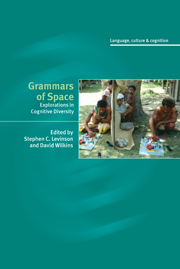Book contents
- Frontmatter
- Contents
- List of figures
- List of tables
- List of contributors
- Preface
- 1 The background to the study of the language of space
- 2 Towards an Arrernte grammar of space
- 3 Sketch of a Jaminjung grammar of space
- 4 Prolegomenon to a Warrwa grammar of space
- 5 The language of space in Yélî Dnye
- 6 Prolegomena to a Kilivila grammar of space
- 7 A sketch of the grammar of space in Tzeltal
- 8 Spatial reference in Yukatek Maya: a survey
- 9 Approaching space in Tiriyó grammar
- 10 Elements of the grammar of space in Ewe
- 11 Spatial language in Tamil
- 12 A grammar of space in Japanese
- 13 Some properties of spatial description in Dutch
- 14 Patterns in the data: towards a semantic typology of spatial description
- Appendices
- References
- Author index
- Language/Language family index
- Subject index
1 - The background to the study of the language of space
Published online by Cambridge University Press: 22 September 2009
- Frontmatter
- Contents
- List of figures
- List of tables
- List of contributors
- Preface
- 1 The background to the study of the language of space
- 2 Towards an Arrernte grammar of space
- 3 Sketch of a Jaminjung grammar of space
- 4 Prolegomenon to a Warrwa grammar of space
- 5 The language of space in Yélî Dnye
- 6 Prolegomena to a Kilivila grammar of space
- 7 A sketch of the grammar of space in Tzeltal
- 8 Spatial reference in Yukatek Maya: a survey
- 9 Approaching space in Tiriyó grammar
- 10 Elements of the grammar of space in Ewe
- 11 Spatial language in Tamil
- 12 A grammar of space in Japanese
- 13 Some properties of spatial description in Dutch
- 14 Patterns in the data: towards a semantic typology of spatial description
- Appendices
- References
- Author index
- Language/Language family index
- Subject index
Summary
Spatial language and cognition
Spatial cognition is a fundamental design requirement for every mobile species with a fixed territory or home base. And there is little doubt that it plays a central role in human thinking and reasoning. Indeed, the evidence for that centrality is all around us, in our language where spatial metaphors are used for many other domains, in the obvious cognitive utility of diagrams and tables, and in the special role of place in memory. The idea that space is a fundamental intuition built into our nature goes back at least to Kant (1768), and the idea that our apperception of space is governed by cognitive universals informs much current cognitive science.
But in some ways human spatial cognition is puzzling. First, it is unspectacular – we are not as a species, compared to bees or pigeons, bats or whales, particularly good at finding our way around. Second, human spatial cognition is obviously variable – hunters, sailors and taxi-drivers are in a different league from the ordinary city-dweller. This suggests that many aspects of effective spatial thinking depend on cultural factors, which in turn suggests limits to cognitive universals in this area.
The language of space becomes an important focus of research, then, for a number of reasons. First, it may help to reveal the underlying conceptual structure in human spatial thinking, which may be much harder to extract from an inarticulate species. Naturally, universals of spatial thinking should be reflected in universal conceptualizations in spatial language.
- Type
- Chapter
- Information
- Grammars of SpaceExplorations in Cognitive Diversity, pp. 1 - 23Publisher: Cambridge University PressPrint publication year: 2006
- 19
- Cited by



